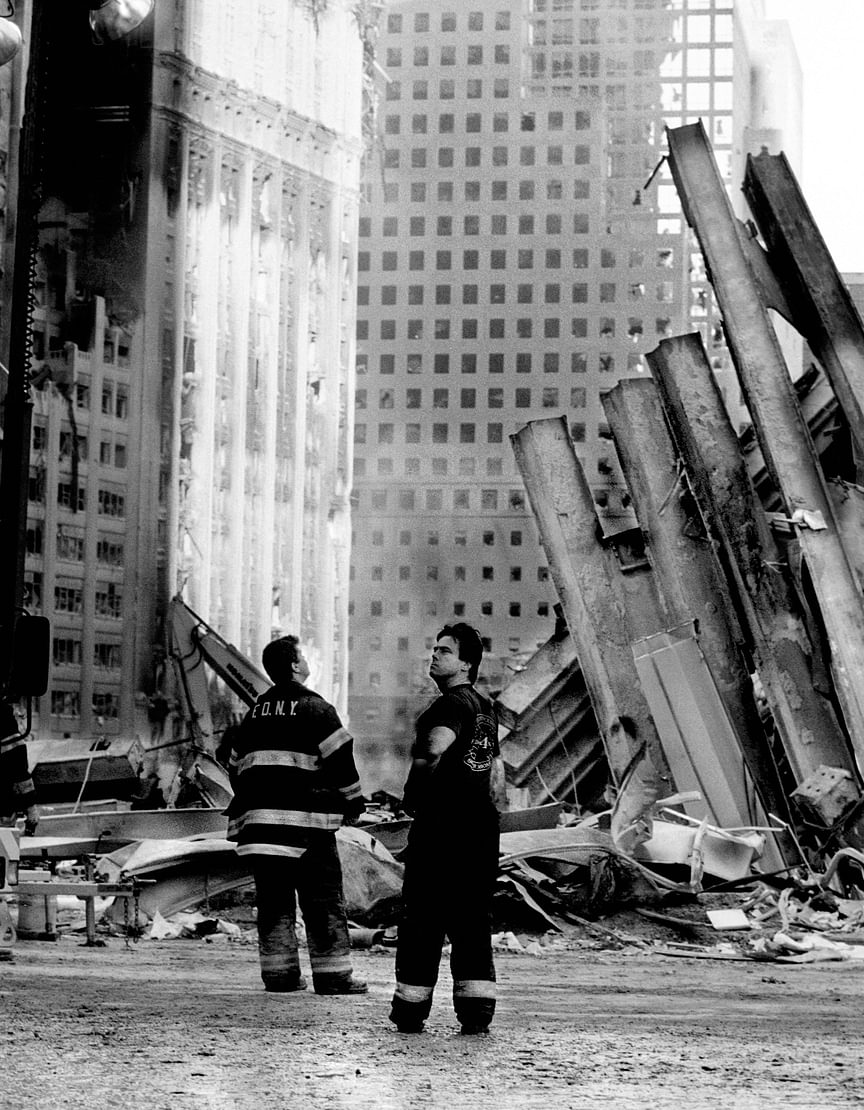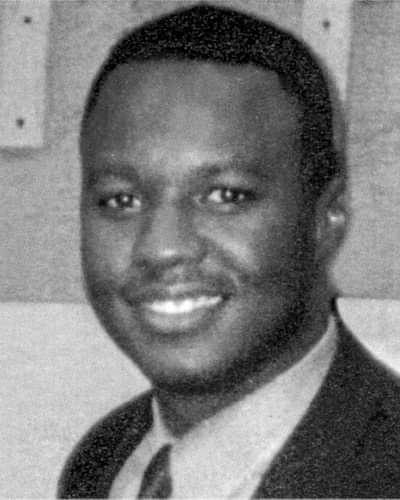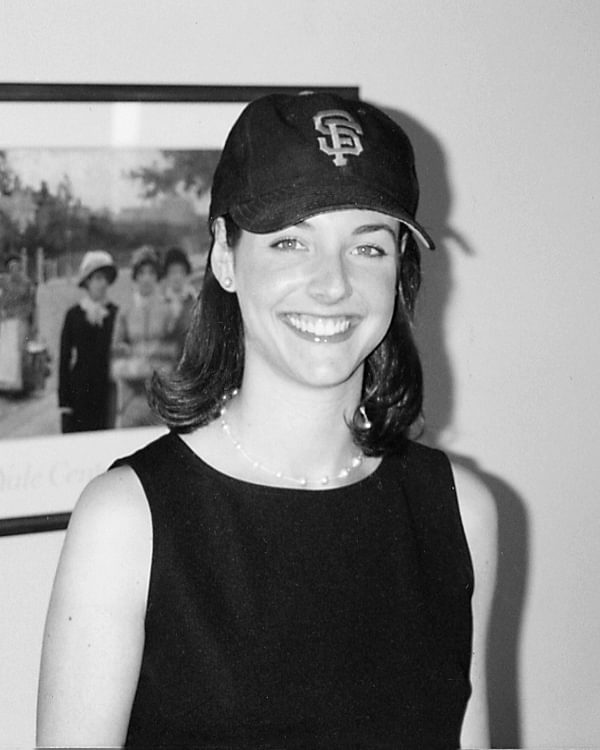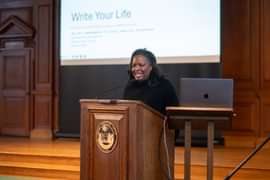
September 10, 2021
Andover remembers, through sorrow and hope
A look back on the 20th anniversary of 9/11Close your eyes and you can see the moment America changes. Just a few seconds after 9:03 a.m., Eastern time, on September 11, 2001, when a second plane hit the South Tower of the World Trade Center.
Aziz Alkahalifa ’02 was walking across campus with a friend he had just made at All-School Meeting. Mindy Diane Feldman ’73, suddenly feeling vulnerable in her midtown Manhattan apartment, boarded a city bus in the hopes of finding safer refuge. Alan Albright ’59 was returning to California after spending the summer in France when his plane was suddenly ordered to land in Newfoundland.
No matter where you were on that blue-sky morning, when a second plane hit, an awakening happened: the shared knowledge that this was no accident and life would never be the same.
Two decades have passed since the terrorist attacks on the World Trade Center in New York City, The Pentagon in Arlington County, Virginia, and the crash of Flight 93 outside Shanksville Pennsylvania. Officially, 2,996 people were killed in the attacks. Three of those lives lost included two Phillips Academy alumni, Todd Isaac ’90 and Stacey Sanders ’94, who both worked in the North Tower of the World Trade Center, and Richard Ross (father of Abigail Ross ’94), who was a passenger on American Airlines Flight 11.
Twenty years ago, Andover magazine invited students, alumni, faculty, administrators, and staff to share their memories of the day. A flurry of essays landed, resulting in a special section published in the winter of 2002, September 11 Reflections. As we commemorate the anniversary of a dark day in history—and in the spirit of coming together in difficult times—we thank the Andover community for sharing these personal memories and thoughtful observations about September 11, 2001, and its aftermath.
Today, these many and varied voices from around the globe remind us that heroes are everywhere—and we are at our best when times are at their worst.
Free Speech in a Time of Conflict
by Victor W. Henningsen III ’69
In Federalist No. 10, James Madison wrote that disagreement and argument were central pillars of a free republic. The larger the population, the more diverse the opinions; the more diverse the opinions, the less the likelihood of a permanent majority, something which would surely lead to oppression and tyranny.
Madison laid out a central paradox of the American republic: A free society stays that way by ensuring open discussion of ideas, yet that very freedom leaves us subject to the dangers of anarchy, subversion and treachery. In guaranteeing such freedom, in other words, we risk becoming the architects of our own frustration—we create the very tools by which others may bring us down. Thus, liberty must be balanced by order.
Throughout their history, Americans have wrestled with that tension between liberty and order. And at times of national danger, the United States has restricted basic freedoms to preserve order. We know about restrictions of freedoms of speech and the press under Presidents Adams and Wilson, the internment of Japanese-Americans during World War II, the systematic silencing of criticism during the McCarthy era of the 1950s. There are plenty of examples, and there are both Republican and Democratic administrations to hold responsible. Indeed, the most extensive infringement on civil liberties in American history occurred under the direction of President Abraham Lincoln.
In most cases, the Supreme Court of the United States upheld the government’s actions. And yet most historians have judged that, in each case, the government action was worse than the crisis it meant to address.
But historians have the luxury of hindsight. They know what happened, how it turned out. They can judge. We live our lives in the present. We don’t know what will happen, how it will turn out. We must guess—and the consequences of guessing incorrectly are often great. And in times of crisis, of national danger, we fear. We fear for our own survival and we fear for the survival of the republic.
It is understandable, then, that at such moments many of us believe that liberty must give way to the need for order. In 1919, writing in Schenck v. U.S., Justice Oliver Wendell Holmes Jr. argued that when speech presented a “clear and present danger” to the safety of the nation, the government could suspend the guarantees of the first amendment. In 1951, in Dennis v. U.S., Justice William O. Douglas echoed Holmes, writing, “There comes a time when even speech loses its constitutional immunity. Speech innocuous one year may at another time fan such destructive flames that it must be halted in the interests of the safety of the Republic.”
 Todd Isaac ’90 lost his life in the 9/11 attack at the World Trade Center.
Todd Isaac ’90 lost his life in the 9/11 attack at the World Trade Center.
Today, many say that this is, again, such a time. The United States has experienced an unprecedented horror. We are engaged in a struggle that will change all of our lives. The fact that much of the danger appears to come from within our own borders heightens our sense of crisis, our fear and our desire to protect ourselves and each other from a hidden enemy—an enemy that uses the advantages of an open society in attempting to destroy it.
In the immediacy of crisis—on Sept. 11—many Americans observed that the worst of times brought out the best in people. In the long run, however, the anxiety that comes with the worst of times often forces us to confront the worst in ourselves and in each other. During the last few months people have been pressured to put up flags or to take them down. On street corners, in newspapers, on the air, our fellow citizens argue vociferously that America can do no wrong—or that America can do no right. On both sides of the political spectrum people have been warned that they must watch what they say and watch what they do. Passion, outrage, anger, recrimination—these things emerge at times of crisis and fear. They do not wear specific political labels; they do not belong to particular faiths; they are not the exclusive property of one side or the other.
 Stacey Sanders ’94 was working at One World Trade Center when she perished in the September 11 attack.
Stacey Sanders ’94 was working at One World Trade Center when she perished in the September 11 attack.
How do we deal with this? We have feelings about what has happened—usually passionate ones—and we disagree. What do we do when, as Holmes put it, we confront the thought, the idea we hate?
Well, first, we might remember, as Justice Douglas wrote in the Dennis case, that in a democratic society “free speech is the rule, not the exception. [A] restraint [on such speech], to be constitutional, must be based upon more than fear, on more than passionate opposition against the speech, on more than a revolted dislike for the contents.” Here Douglas was again following Justice Holmes, who wrote in Abrams v. U.S. that freedom of speech permitted free trade in ideas and that “the best test of truth is the power of the thought to get itself accepted in the competition of the market.”
So freedom of speech does include freedom for the thought we hate. But such expression invites, indeed requires, discussion. These discussions are hard, but they are necessary, for they are the marketplace in which ideas, however radical or unpopular, are weighed and tested, accepted or rejected in the light of reason and intellect.
What do we do when, as Justice Oliver Wendell Holmes Jr. put it, we confront the thought, the idea we hate?
Americans have had such discussions in recent months. They will have many more. Let me offer four guidelines for such conversations.
First, assume good faith on the part of people you debate. They believe as strongly as you do.
Second, debate the issues, not the person. Attacking your opponent personally will not advance your argument or further anyone’s understanding of the issue; it will make you look like a jerk.
Third, assume complexity. Truly important issues are never simple. If you assume they are simple, you will never understand them.
Fourth and last, as Oliver Cromwell once urged his countrymen, think that you might be mistaken. A little humility on your part, a willingness to entertain the idea that you don’t have a lock on the truth, will go a long way to further mutual understanding.
We must recognize, as we undertake difficult conversations, that no one has a monopoly on truth or decency; that genuine progress comes from understanding; and that understanding requires compassionate listening as much as it does passionate advocacy. In the process of those often-heated interchanges, we will learn one of the fundamental truths of a free society, expressed years ago by historian A. Whitney Griswold: “The only sure weapon against bad ideas is better ideas.”
Debating ideas openly and fairly will help us figure out which are the bad ones and which the better. As we do that, we should remember James Madison’s point: Diversity of opinion and robust debate are not threats to the security of the republic; they are its salvation.
Victor W. Henningsen III ʼ69 [was] chair of the Department of History and Social Science at the time. This article is adapted from his speech to Phillips Academy students at All-School Meeting on October 17, 2001.
Categories: Magazine
Other Stories

Best-selling author Rachel Howzell Hall delivers MLK Day keynote




